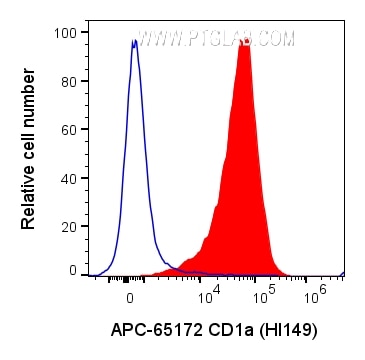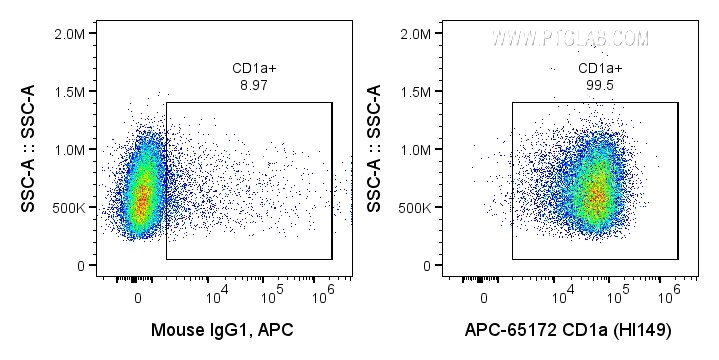Validation Data Gallery
Tested Applications
| Positive FC detected in | MOLT-4 cells |
Recommended dilution
| Application | Dilution |
|---|---|
| This reagent has been pre-titrated and tested for flow cytometric analysis. The suggested use of this reagent is 10 µl per 10^6 cells in a 100 µl suspension or 10 µl per 100 µl of whole blood. | |
| Sample-dependent, Check data in validation data gallery. | |
Product Information
APC-65172 targets CD1a in FC applications and shows reactivity with human samples.
| Tested Reactivity | human |
| Host / Isotype | Mouse / IgG1, kappa |
| Class | Monoclonal |
| Type | Antibody |
| Immunogen | Human thymocytes 相同性解析による交差性が予測される生物種 |
| Full Name | CD1a molecule |
| Calculated molecular weight | 327 aa, 37 kDa |
| GenBank accession number | BC031645 |
| Gene Symbol | CD1A |
| Gene ID (NCBI) | 909 |
| RRID | AB_2883040 |
| Conjugate | APC Fluorescent Dye |
| Excitation/Emission maxima wavelengths | 650 nm / 660 nm |
| Form | Liquid |
| Purification Method | The purified antibody is conjugated with allophycocyanin (APC) under optimum conditions. The conjugate is purified by size-exclusion chromatography. |
| UNIPROT ID | P06126 |
| Storage Buffer | PBS with 0.09% sodium azide , pH 7.3 |
| Storage Conditions | Store at 2-8°C. Avoid exposure to light. Stable for one year after shipment. |
Background Information
CD1a is an antigen-presenting protein that binds self and non-self lipid and glycolipid antigens and presents them to T-cell receptors on natural killer T-cells. During protein synthesis and maturation, CD1 family members bind endogenous lipids that are replaced by lipid or glycolipid antigens when the proteins are internalized and pass through endosomes, before trafficking back to the cell surface.
Protocols
| Product Specific Protocols | |
|---|---|
| FC protocol for APC CD1a antibody APC-65172 | Download protocol |
| Standard Protocols | |
|---|---|
| Click here to view our Standard Protocols |

